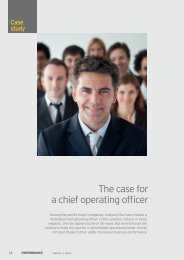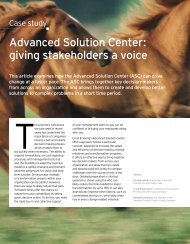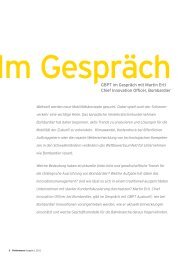PERF RMANCE 04 - The Performance Portal - Ernst & Young
PERF RMANCE 04 - The Performance Portal - Ernst & Young
PERF RMANCE 04 - The Performance Portal - Ernst & Young
Create successful ePaper yourself
Turn your PDF publications into a flip-book with our unique Google optimized e-Paper software.
Article<br />
Choosing the right technology:<br />
a framework for success<br />
Many of today’s new<br />
products employ<br />
new technologies.<br />
But it’s often hard for<br />
companies to decide<br />
which technology will<br />
work best or be most<br />
successful for these products in the future.<br />
Yet the success of the product may depend<br />
on choosing the right technology. No<br />
wonder there is a huge race in technologydriven<br />
markets.<br />
This race is particularly visible in the<br />
automotive field. Companies around<br />
the globe are vying to build a new, less<br />
polluting automobile engine that does<br />
not run on gasoline. In the US, for<br />
instance, General Motors (GM) spent over<br />
US$1 billion on developing an electric<br />
car that runs on a hydrogen fuel cell. It<br />
originally chose hydrogen fuel as the basis<br />
for the engine. Yet mass production of an<br />
electric car for sales to the public is not<br />
expected until 2013.<br />
In contrast, Tesla Motors 1 , spent about<br />
US$105 million on developing a new<br />
electric automobile. Its electric motor<br />
uses a radical configuration of 6831<br />
lithium-ion batteries. <strong>The</strong> car can be<br />
recharged at home from a regular electric<br />
socket. This is a much simpler solution<br />
than the one originally developed by GM,<br />
which required the costly storage and<br />
transportation of corrosive hydrogen<br />
fuel. A new Tesla car was launched in<br />
early 2008.<br />
1<br />
Tesla Motors Inc. is a Silicon Valley startup that engages in the design, manufacture, and sale of electric vehicles based on lithium-ion batteries. At present Telsa produces<br />
around 15 cars per week — mostly custom-ordered vehicles manufactured to owners' specifications. Adapted from Wikipedia, 22 August 2010.






